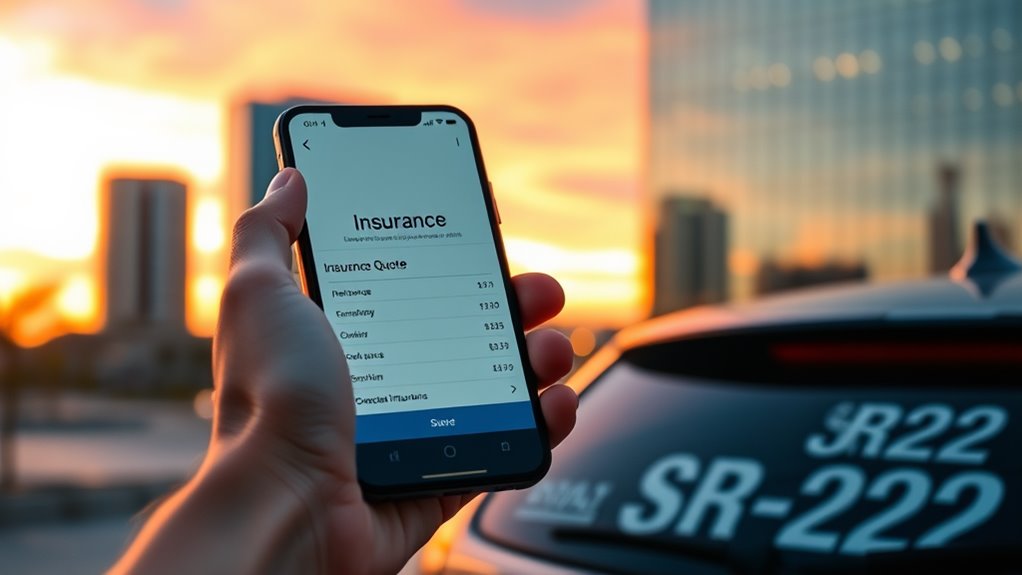Renewing your insurance in California can be an intimidating task, but it doesn't have to be. By understanding key factors like your current policy, potential discounts, and your driving record, you can greatly cut costs. It's crucial to approach this process methodically to guarantee you're not overspending. Curious about the specific steps you can take to maximize your savings and tailor your coverage? Let's explore the best strategies together.
Key Takeaways
- Review your current insurance policy for coverage limits and potential gaps to ensure you're adequately protected.
- Shop around for competitive rates by comparing quotes from multiple providers annually, as rates frequently change.
- Inquire about available discounts, such as multi-policy bundles or non-smoker discounts, to lower your premiums.
- Monitor renewal deadlines closely to avoid late penalties and ensure timely submission of required documentation.
- Customize your coverage based on specific needs, balancing between minimum and full coverage to manage costs effectively.
Understand SR22 Insurance Requirements

When you're maneuvering the complexities of auto insurance in California, understanding SR22 insurance requirements is essential, especially if you've faced major traffic violations.
An SR22 isn't insurance but a "Certificate of Financial Responsibility" that proves you meet minimum coverage requirements. This certificate is important for reinstating your driving privileges after incidents like DUI offenses or at-fault accidents without insurance. It's crucial to remember that SR-22 is required for a specified period, which varies based on the severity of your violation.
An SR22 serves as proof of financial responsibility, crucial for regaining driving privileges after serious violations.
You'll need at least $15,000 per person and $30,000 per accident for bodily injury liability, plus $5,000 for property damage. Your insurance company files the SR22 with the DMV, and you must maintain coverage for three to five years, depending on your violation. Failing to keep continuous coverage can lead to further penalties and license suspension, as the failure to maintain coverage can result in additional fines or even a longer SR22 requirement.
Review Your Current Insurance Policy
Before renewing your insurance, it's crucial to thoroughly review your current policy to guarantee it still meets your needs.
Start by examining the policy terms and understanding your coverage limits—this prevents both over-insuring and under-insuring. Check your deductible amounts to assess your financial readiness in case of a claim. Be aware of any premium changes since your last renewal, and identify any excluded services that might necessitate additional coverage.
Look for coverage gaps and consider how pre-existing conditions or experimental treatments are handled. Familiarize yourself with the claims process and required documentation, ensuring you know the timelines for settlement.
Staying updated on California regulations can also help you navigate your renewal more effectively.
Shop Around for Better Rates
Reviewing your current insurance policy sets the stage for exploring better options. Start by researching multiple providers; companies like Grange Insurance Association and Auto Club of SoCal offer competitive rates tailored to your needs.
Utilize comparison tools from the California Department of Insurance to evaluate premiums across different insurers effectively. Since insurers adjust their rates regularly, it's smart to compare quotes annually.
Don't overlook local insurers, as they may provide better rates and personalized service. Customize your coverage based on your specific requirements, keeping in mind that the cost varies considerably between minimum and full coverage.
Check for Discounts and Financial Assistance

Although many insurance policies come with standard rates, you might be missing out on significant savings by not checking for available discounts and financial assistance options.
Here are some discounts you should inquire about:
- Multi-Policy Discount: Bundle auto and homeowners insurance for potential savings up to 20%.
- Non-Smokers Discount: Households without smokers can often reduce premiums.
- Burglar Alarm Discount: Installing security systems may lower your insurance costs by minimizing theft risks.
- Income-Based Discounts: Proposed regulations aim to provide equitable discounts for lower-income individuals.
Additionally, explore state-sponsored programs and group insurance plans that can further reduce your costs.
Always ask your insurer about any specific programs or discounts that may apply to your situation.
Keep Your Driving Record Clean
Maintaining a clean driving record is essential not only for your safety but also for keeping your insurance premiums manageable. By driving defensively and obeying traffic laws, you minimize the risk of accidents and avoid costly violations. Each traffic violation increases your perceived risk to insurers, potentially leading to higher premiums.
Completing a defensive driving course can enhance your skills and even remove points from your record. Additionally, staying distraction-free while driving is vital in preventing accidents. Remember, serious violations, like DUIs, can drastically increase your rates or lead to policy non-renewal.
Regularly reviewing your driving record helps catch inaccuracies that could unfairly affect your insurance costs. Prioritize these practices to enjoy long-term savings on your premiums.
Update Your Personal Information
Updating your personal information with your insurance provider is essential for guaranteeing you receive important communications and renewals without delay.
Updating your personal information with your insurance provider is crucial for timely communications and renewals.
Here are some key steps to follow:
- Use Official Channels: Update your information electronically through approved services like Sircon.
- Notify Immediately: Inform your insurance commissioner right away about any address or contact changes.
- Keep Contact Details Current: Regularly update your email and phone numbers to guarantee timely communications.
- Check for Renewal Notices: Regularly verify your mailbox for renewal notifications to avoid lapses in coverage.
Monitor Renewal Deadlines and Procedures

To guarantee a seamless insurance renewal process in California, it's important to closely monitor renewal deadlines and procedures.
The California Department of Insurance sends renewal notices 90 days before your license expires, so keep an eye on your email or mail for these notifications.
You can complete renewals online through the CDI's service, but make sure to submit your continuing education hours beforehand.
If you miss the deadline, you could face a 50% late renewal penalty, and after a year, you'll need to reapply.
Utilize online tools and resources available on the CDI and Covered California websites to facilitate this process, ensuring you stay compliant and avoid unnecessary fees.
Staying proactive will save you time and money.
Conclusion
Renewing your insurance doesn't have to feel like pulling teeth. By following these tips, you can navigate the process smoothly and potentially save a good chunk of change. Remember to review your policy, shop around, and stay on top of discounts and deadlines. With a proactive approach, you'll not only secure the coverage you need but also make your wallet a little happier. So, take the reins and make insurance renewal work for you!

